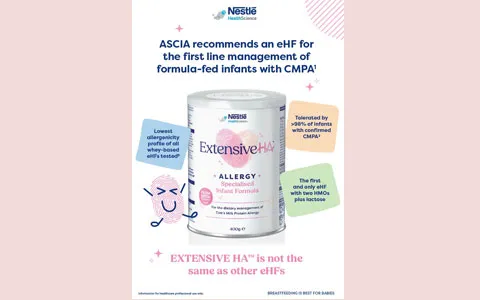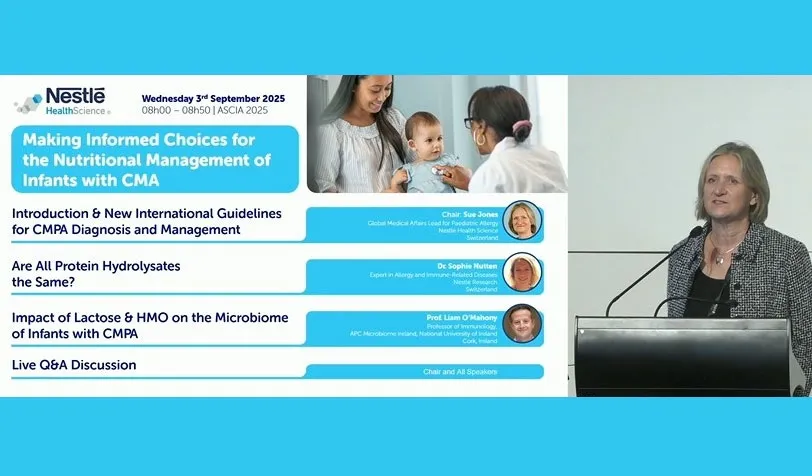In a randomised clinical trial by Vandenplas et al. 2022, using an extensively hydrolyzed formula (EHF) supplemented with two human milk oligosaccharides (HMO) in infants with cow’s milk protein allergy (CMPA), it demonstrated a reduction in frequency of upper respiratory tract infections and a lower incidence of ear infections at 12 months as well as supporting normal growth in infants with CMPA.
Clinical Paper: Effects of an Extensively Hydrolyzed Formula Supplemented with Two Human Milk Oligosaccharides
- 13/02/2023 - 03:13 pm
EXTENSIVE HA™ is a specialised whey based, extensively hydrolysed infant formula (eHF), suitable for mild to moderate Cow’s Milk Protein Allergy (CMPA).EXTENSIVE HA™ is a special medical purpose product for infants, formulated for infants with Cow’s Milk Protein Allergy, for use only under medical supervision.
Join Paediatric Gastroenterologist and Allergist, Dr Ralf Heine, for an insightful session exploring the emerging benefits of Human Milk Oligosaccharides (HMOs) and Lactose in formula-fed infants with Cow’s Milk Protein Allergy (CMPA). This webinar will highlight how these components support immune system development in a compromised population, offering a deeper understanding of their role in allergy management.
Making Informed Choices for the Nutritional Management of Infants with CMPA
Compleat® paediatric is a nutritionally complete 1.2kcal/ml standard enteral tube feed, containing food-derived ingredients (rehydrated chicken meat and vegetables, peach puree, orange juice from concentrate). Compleat® paediatric is a Food for Special Medical Purposes for use under medical supervision.
Nutritionally complete paediatric tube feed with a unique blend of whole foods
Purposefully designed with wholesome and familiar food ingredients to meet the nutritional needs of children requiring enteral nutrition.
In this webinar, Jodie Bartle, Paediatric Dietitian, Oncology/Immunology at The Royal Children's Hospital Melbourne, takes us through the findings of her clinical research and how she arrived at a Nutrition Feeding Algorithm for Children and Adolescents undergoing Haematopoietic Stem Cell Transplantation (HSCT), to assist clinicians to make objective and consistent enteral feeding decisions.
Children with medical complexity switched to AA-MCT formula demonstrated growth. Formula was well tolerated, as shown by increased intake of formula, appropriate growth for age and BMI z-scores up to 1 year post-switch.
Nutrition support during the acute phase post allogeneic haematopoietic stem cell transplantation (HSCT) is required to optimise short- and long-term outcomes for children. An algorithm was developed and evaluated to assist clinicians to make objective and consistent enteral feeding decisions and has shown to help support better weight outcomes and reduced LOS in this patient cohort.
The Nutritional Support in Children with Neurological Impairment brochure is an ideal resource on how to support children with Cerebral Palsy in their nutritional management, taking a wholistic and multi-disciplinary approach. This resource is ideal for those in the field of Neurology, Gastroenterology, Physiotherapy, Nursing, Speech Therapy, Social Work, and Nutrition and Dietetics.
Paediatric Nutrition in Practice (PNP) eLearning Program aims to provide information to healthcare professionals who are looking for practical guidance on relevant issues surrounding the nutrition management of infants, children and adolescents. This eLearning Program has 12 modules that can be completed.
Watch our webinar as Dr. Graeme O'Connor Ph.D., RD, MBDA reviews the clinical evidence on the impact of an enteral formula with food-derived ingredients in children.











